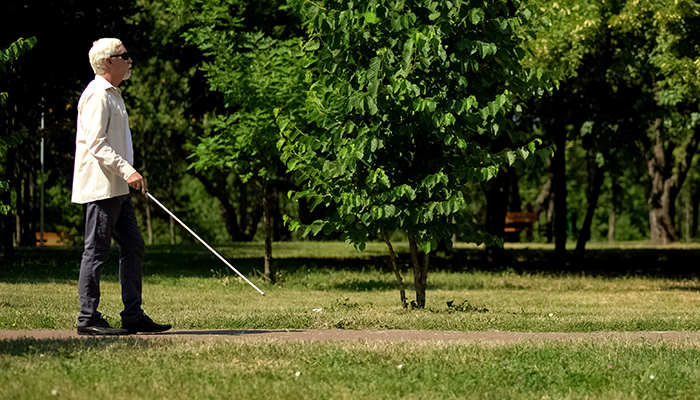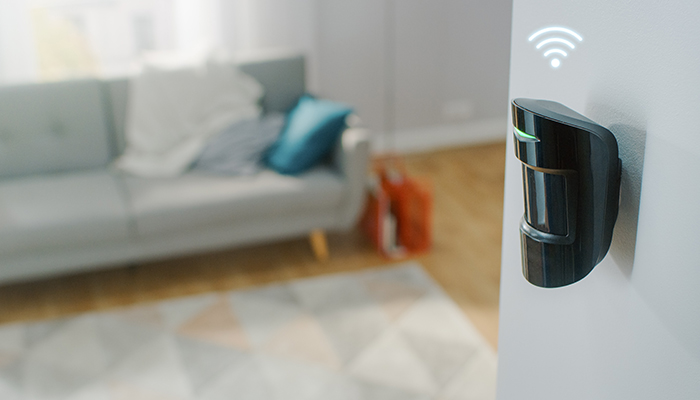The Caregiver Coach
Helpful tips for family caregivers
April/May 2021
The prospect of losing one’s vision can be terrifying. But once you get past the initial fears, there are lifestyle modifications that make the actual experience much easier to take. Draw upon the wisdom of those who have been there as you work with your loved one to positively address this challenging development. In our middle article we share important information you should know ahead of time if your relative prefers to be cremated. Last, we look at questions to help you sort through the wide array of monitoring technology designed to speed response to a safety issue.
Share Page: [addtoany]
Coping with vision loss
 It’s common for those newly diagnosed with a vision-loss condition to feel anxious and depressed.
It’s common for those newly diagnosed with a vision-loss condition to feel anxious and depressed.
Understandably so!
They worry about losing their independence. Also, that they will need help with many activities of life. This in turn suggests a loss of privacy.
Many newly diagnosed persons report a sudden lack of confidence and feelings of worthlessness.
If this describes your loved one, allow them time to grieve. Time to mentally and emotionally adjust. They might even benefit from the assistance of a counselor or therapist.
And take heart. There is good reason to believe that your loved one’s attitude will come around. A survey of older adults who are living with significant vision loss revealed that 84% report feeling more positive and confident now than they did when they were first diagnosed.
Those respondents who expressed a willingness to adapt continued to lead full and rewarding lives. They felt they were still in control. Paradoxically, such resilience was best achieved by those who reached out for help.
Here’s what those with vision loss recommended for people newly diagnosed:
- Join a low-vision support group. Learn that you are not alone. At the least, find a person with the same vision-loss condition to share concerns and solutions.
- Learn about the condition and advocate for your needs.
- Ask the doctor for a referral to a low-vision specialist for adjustment classes. For instance, adaptive living skills to learn how to prepare meals and modify the house for independence. Or orientation and mobility classes to learn balance and navigation.
- Be open to new devices and technology.
- Find out about local vision support services.
- Be patient. Take one day at a time.
As a family caregiver, you will have your own emotional response to the diagnosis. It’s natural to want to “help.” Rather than do things for your loved one, help them stay independent and in control of their life. Doubtless they will experience frustration and challenges. You will need to be patient and encourage them to figure out how to do things anew. Demonstrating your belief in their ability to overcome problems will be the greatest service of all.
Return to topWhat is "cremation authorization"?
 With National Healthcare Decisions Day coming up on April 16, it’s good to review who your loved one has chosen as their healthcare power of attorney (sometimes called a “proxy” or “agent”). This is who will make decisions for them when they are no longer able to do so themselves. Often this is needed in end-of-life situations.
With National Healthcare Decisions Day coming up on April 16, it’s good to review who your loved one has chosen as their healthcare power of attorney (sometimes called a “proxy” or “agent”). This is who will make decisions for them when they are no longer able to do so themselves. Often this is needed in end-of-life situations.
The proxy is identified in a legal document called an “advance directive.”
Oddly enough, the healthcare proxy is not necessarily empowered to make decisions after the death, such as funeral arrangements.
If your relative prefers cremation and has made “preneed” arrangements with a funeral home, a “self-authorization” for cremation may have been signed. The funeral director will have that on file. If so, get a copy and store it with the advance directive. (Wills or trusts may not be read for several days or weeks after a death. Decisions about burial or cremation must be made before then.)
Be forewarned that special paperwork may be required for cremation. It is not unusual for this choice to generate family conflict.
To address potential lawsuits, funeral directors often need a “cremation authorization form” signed by the next of kin. Typically, the spouse. If no spouse, then child(ren). Note: If there is more than one adult child, it may be that all, or at least a majority, need to sign. Rules vary by state. Talk to a funeral director in the state where your loved one lives.
Some states do turn to the will or living trust to authorize a decision maker for disposition of the body. The executor of the will, or the trustee, may be the one who has the power to sign off for cremation.
Whoever the legal decision maker is, be sure they know your loved one’s wishes.
Return to topTime for smart monitoring?
 From sensors and cameras to remote alarm systems, today’s marketplace offers a plethora of technology to help older adults safely age in place. Those devices with monitoring features are particularly useful if your loved one lives on their own, whether near to you or far away. Indeed, many apps and devices can help you stay up to date despite distance and separate households. The options, however, can be overwhelming!
From sensors and cameras to remote alarm systems, today’s marketplace offers a plethora of technology to help older adults safely age in place. Those devices with monitoring features are particularly useful if your loved one lives on their own, whether near to you or far away. Indeed, many apps and devices can help you stay up to date despite distance and separate households. The options, however, can be overwhelming!
The following questions can help you sort through priorities:
- Who will be in charge of the devices and apps? Is the technology simple enough for your loved one to install? To operate? Will they need a smartphone? Who do they call with questions?
- Do you have your loved one’s permission? Cameras, sensors, and alarms, no matter how well intended, are an invasion of privacy. Is the benefit of greater security a trade-off your relative has agreed to?
- Are the data adequately protected? Perceptive devices absorb an amazing amount of information about lifestyle, interests, and health concerns. Where are these data stored? Who has access? Besides monitoring, how are the data used? Are they sold to others? For what purpose?
- Can devices be managed together in one place? Consider there might be one app for the doorway and windows, another for the smoke detectors, and a third for medications. Is there any way they can coordinate on a central dashboard? What if you add others?
- Who gets the first call? A 24/7 service? You? An emergency responder? Monitoring functions exist most often to identify a problem quickly and send help. Are you prepared to be the first call and respond night or day? An automated service can alert 911, but what about false alarms? A service with a live person on the other end offers superior security and flexibility. It may not be cheap, but neither is the emergency medical service bill from a false alarm!

